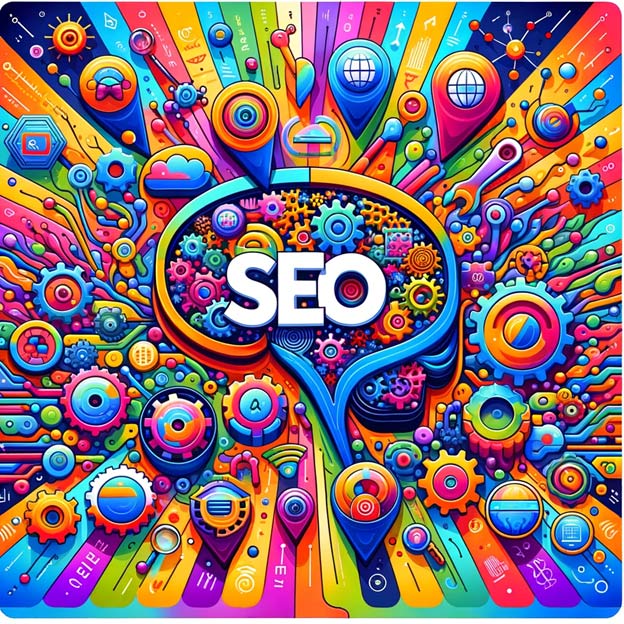The only constant in life that is ever-present is change. And constant change is why savvy SEO (Search Engine Optimization) strategists rely on innovative tools to stay ahead of the curve. ChatGPT, OpenAI’s advanced language model, has emerged as a game-changing tool. This post delves into ChatGPT’s functionalities, exploring its rising popularity and demonstrating how to leverage ChatGPT to optimize your SEO efforts.
What is ChatGPT?
ChatGPT is a cutting-edge language model that mimics human-like text generation, capable of understanding and responding to a wide array of queries with remarkable coherence and creativity. Built on a foundation of vast data and sophisticated algorithms, it can generate content, answer questions, simulate dialogues, and much more, making it a versatile tool for a plethora of applications.
ChatGPT’s Rise in Popularity
ChatGPT is so popular because of its lightning-fast ability to generate human-like text based on inputs. Its adaptability, efficiency, and high-quality output make it an invaluable asset for content creators, marketers, and SEO professionals.
This post will bridge the gap between ChatGPT’s capabilities and SEO strategy. We’ll explore how ChatGPT can assist in keyword research, content creation, improving user engagement, analyzing SEO data, and much more. You’ll learn how to leverage ChatGPT to optimize your content for search engines, your content marketing strategy, and your website’s visibility and ranking. Integrating ChatGPT into your SEO toolkit can unlock new potential and drive meaningful results in your digital marketing efforts.
18 Ways to Use ChatGPT to Level Up Your SEO
Whether you’re an SEO veteran looking to incorporate AI into your strategy or a newcomer ready to dig in, this guide will provide insights into making the most of ChatGPT for SEO success.
1. Keyword Research and Analysis
ChatGPT can help generate a comprehensive list of keyword research and suggestions based on your initial input. It identifies long-tail keywords, which are typically less competitive and more targeted, improving your content’s ranking. By analyzing the context around your main keywords, ChatGPT suggests semantically related keywords, enhancing your content’s relevance and authority in a given topic. Below are 15 keyword variations centered around coffee. Simply select a single keyword from this list to explore even further variations.
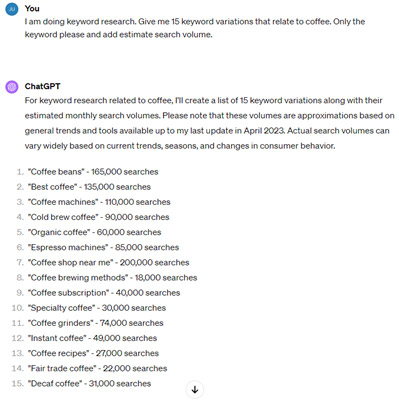
2. Content Creation and Optimization
One of the biggest challenges in SEO is creating content that serves a dual purpose: informative for users and optimized for search engines. ChatGPT can help generate well-written, unique content quickly. Moreover, it helps optimize existing content by suggesting improvements, seamlessly integrating keywords, and ensuring readability, all critical factors for SEO. Below is a request to create a 1,500-word blog post.
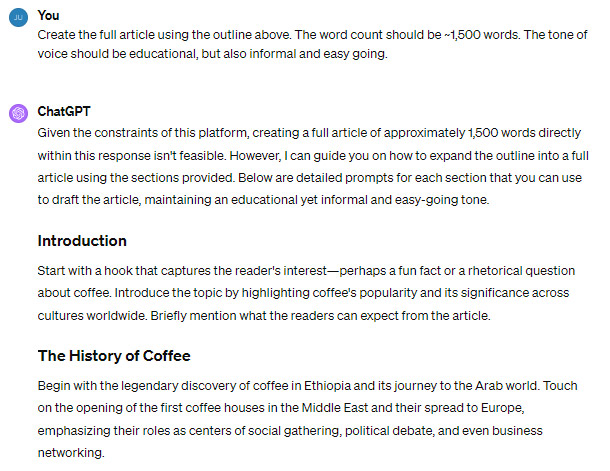
3. Generating Meta Tags
Meta titles and descriptions are crucial for SEO, influencing both click-through rates and search engine rankings. As shown below, ChatGPT can incorporate target keywords when creating compelling meta titles and descriptions, encouraging users to click your link on the search engine results pages (SERPs).
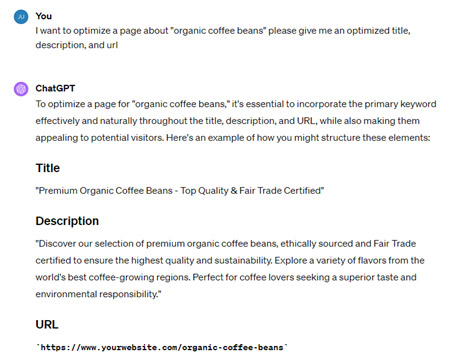
4. Creating FAQs and Featured Snippets
ChatGPT can also help generate both common and concise FAQs relevant to your business or content. This improves user experience and increases the chances of Google spotlighting your content in its “Featured Snippets” or “People Also Ask” sections, driving more traffic to your site. Below is an example of how ChatGPT can do this.
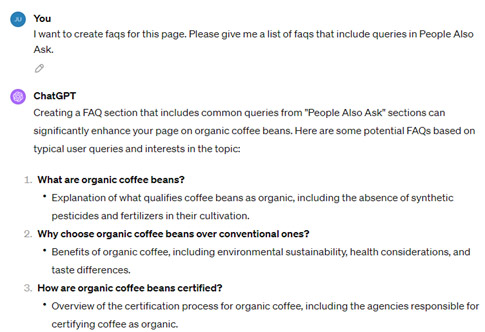
5. Improving User Engagement
Compelling, relevant content reduces bounce rates and increases the time users spend on your website—all music to search engine ears. ChatGPT helps create interactive content, such as quizzes, surveys, or engaging blog posts, enhancing user engagement and potentially improving your site’s SEO performance. If you opt for a quiz, ChatGPT can even create the code to implement on a website! Examples shown below.
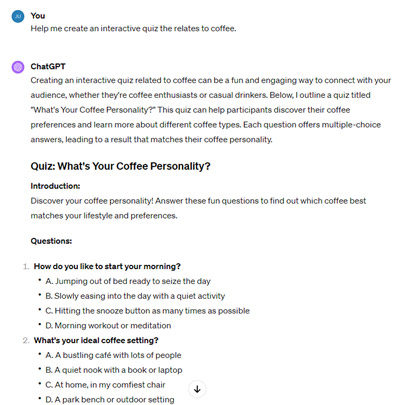

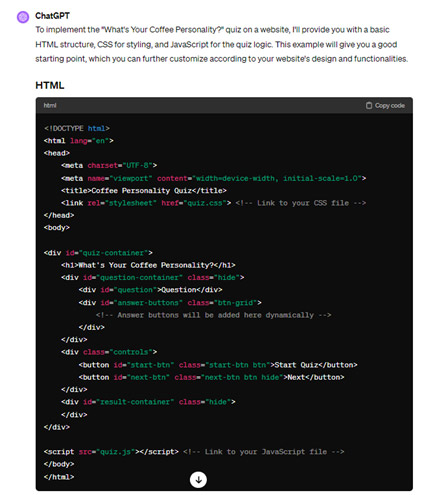
6. Content Personalization for Different Audiences
ChatGPT can assist in tailoring content to different segments of your audience by adjusting the tone, style, and complexity based on the target demographic. Personalized content is more likely to engage readers and encourage them to interact with your site further.
7. SEO Data Analysis
While primarily known for its content generation capabilities, ChatGPT can also analyze large sets of SEO data, including keyword rankings and website traffic reports. It can summarize this data, highlight trends, and even suggest actionable insights, helping you make informed decisions about your SEO strategy.
8. Automating Customer Service for SEO
By integrating ChatGPT into your website as a chatbot, you can improve customer service by providing instant responses to common queries. This not only enhances user experience but can also increase the time spent on your site and the number of pages visited, positively impacting your SEO.
9. Authority Outreach
Crafting personalized outreach emails can be time-consuming. ChatGPT can streamline this process by generating customized email templates for online authority outreach, making the process more efficient and effective.
10. Monitoring SEO Trends and Updates
Stay current with SEO trends and algorithm updates with ChatGPT’s help. It can sift through volumes of information and summarize the latest news and best practices in SEO, ensuring you remain ahead of the curve.

11. Generate Schema Markup
Schema markup is a powerful SEO tool that helps search engines understand your content’s context, which can enhance your visibility in search results. ChatGPT can assist in generating accurate schema markup for various types of content, such as articles, products, FAQs, and more, ensuring your website communicates effectively with search engines.
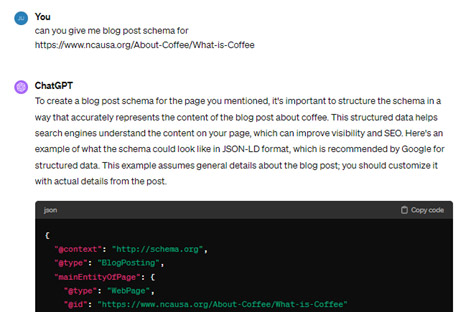
12. Blog Topic Suggestions
Coming up with fresh, engaging blog topics can be a challenge. ChatGPT can generate a list of blog topic suggestions based on current trends, target audience interests, and keyword research, ensuring your content calendar remains full and focused on driving organic traffic.
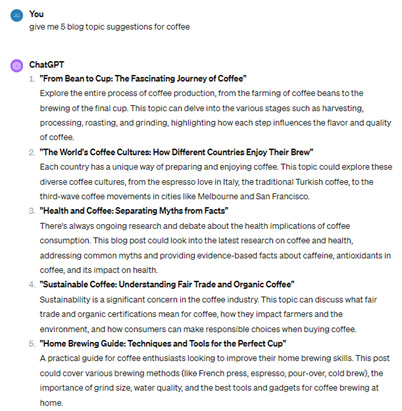
13. Topic Clusters
Creating topic clusters can significantly improve your website’s SEO by organizing content around pillar topics and related subtopics. ChatGPT can help identify potential pillar topics and suggest subtopics, ensuring a well-structured content strategy that boosts your site’s authority and relevance in specific subject areas.
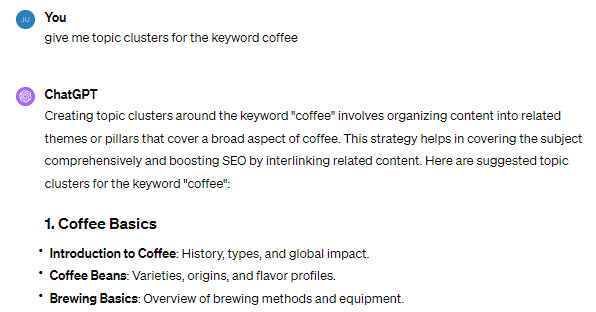
14. Content Outlines
A well-structured content outline is crucial for writing SEO-friendly articles. ChatGPT can generate detailed content outlines, including headings, subheadings, and key points to cover, ensuring your content is comprehensive and optimized for both search engines and readers.
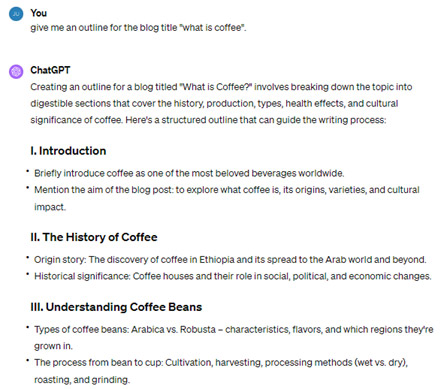
15. Categorize Keywords Based on Relevance
ChatGPT can analyze and categorize keywords based on relevance to different topics or stages in the buyer’s journey. This helps tailor content more effectively to meet user intent and improve search engine rankings.
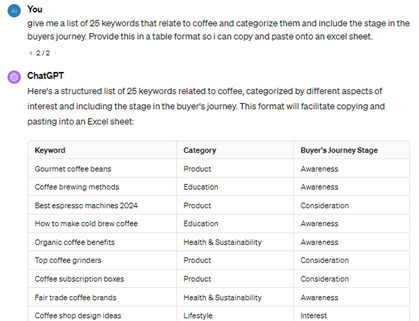
16. Create Crawl Directives for robots.txt
Directing search engine crawlers effectively can improve your site’s SEO by ensuring that important pages are indexed and unnecessary pages are not wasting your crawl budget. ChatGPT can help generate specific directives for your robots.txt file, guiding search engine bots on how to crawl and index your site content.
17. Generate Sitemaps
Sitemaps are how search engines discover and index your website’s pages. ChatGPT can assist in generating XML sitemaps, ensuring all your pages are correctly listed and improving your site’s visibility to search engines.
18. Create Regex Patterns for SEO
Regular expressions (regex) can be used in various SEO tasks, such as defining URL parameters for Google Search Console or creating redirect rules. ChatGPT can help generate regex patterns tailored to your specific SEO needs, simplifying complex tasks.
By incorporating these advanced techniques and tools with ChatGPT’s capabilities, you can significantly enhance your SEO strategy. From generating schema markups to creating effective content strategies with topic clusters and outlines, ChatGPT serves as a multifaceted assistant that can streamline your SEO processes, ensuring your website remains competitive and visible among search engine rankings.
Restrictions of ChatGPT and Considerations for SEO
While ChatGPT offers many opportunities to enhance your SEO strategy, be aware of its limitations. Understanding these constraints will help you navigate potential pitfalls and employ ChatGPT as a complement to your SEO efforts rather than a standalone solution.
- Dependence on Training Data. ChatGPT’s responses are generated based on its training data, which, despite being extensive, may not always be up-to-date with the latest trends, algorithms, or SEO best practices.
- Risk of Non-Original Content. While ChatGPT is adept at generating content quickly, the risk is that the output might not be entirely original or may closely mirror existing web content. This can lead to duplicate content, which can negatively impact SEO. So, use plagiarism checkers and ensure that ChatGPT-produced content is unique and tailored to your site.
- Lack of Personalization. ChatGPT responses are based on learned patterns and data, which means they might not capture your business’s unique voice or brand nuances, which are crucial for engaging your audience. That’s why it’s critical to edit and adapt ChatGPT’s output to reflect your brand’s messaging and tone.
- Overreliance Can Stifle Creativity. Relying too heavily on AI for content creation and SEO tasks can stifle creativity and innovation in your strategy. While ChatGPT can provide a solid foundation or assist with brainstorming, the creative and strategic input from SEO professionals is invaluable for crafting a campaign that truly stands out.
- Ethical and User Experience Considerations. Considering the ethical implications and user experience of using AI-generated content is important. Ensuring transparency with your audience about using AI in content creation can help maintain trust and credibility, which are paramount for long-term success.
Navigating the Limitations
Understanding and navigating these limitations is key to effectively leveraging ChatGPT for SEO. When used wisely, it’s a powerful tool—enhancing productivity, sparking creativity, and supporting various SEO tasks. However, it should be integrated into a broader strategy that includes expert SEO knowledge, up-to-date practices, and deep knowledge of your brand and audience. The combination of ChatGPT capabilities and SEO expertise ensures a balanced, innovative approach that drives results while maintaining authenticity and engagement.
How Menerva Digital Can Help
Elevate your SEO strategy with Menerva Digital, the award-winning digital marketing agency that turns insights into action. Leveraging cutting-edge tools like ChatGPT, we craft bespoke solutions that drive visibility, engagement, and growth. Partner with us to harness the full potential of AI in your SEO efforts and stay ahead of the ever-changing digital landscape. With Menerva enterprise SEO services, it’s not just about ranking higher; it’s about achieving meaningful results that propel your business forward.

